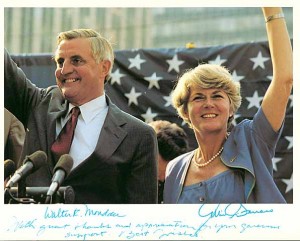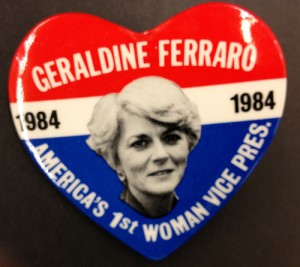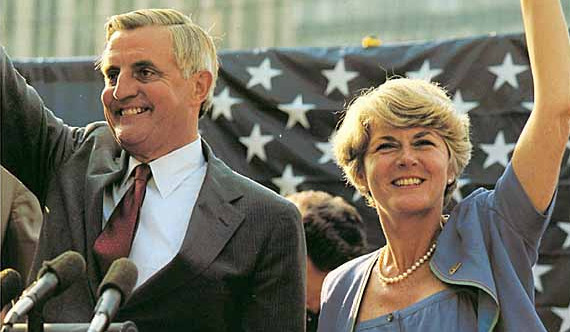Last weekend Brown kicked off its semiquincentenary – its 250th anniversary – with fireworks and a 600-pound cake. The festivities brought together students, Providence locals, Brown alumni and their families and featured Brown graduates from all over the political world. World Bank President Dr. Jim Yong Kim ’82 gave the Opening Celebration Keynote on Friday, the next day U.S. Secretary of Labor Thomas Perez ’83 spoke at the Watson Institute, and as President Christina Paxson toasted Brown’s past and future, four of the five Brown graduates who currently serve as state governors stood beside her.
This weekend, cabinet members and state executives were the most visible representatives of Brown’s close relationship with American politics, but on Friday evening Donna Zaccaro ’83 illuminated a more obscure connection that Brown has to American political history. Zaccaro screened “Geraldine Ferraro: Paving the Way,” a documentary she directed and produced about her mother, the first female vice presidential candidate on a major party ticket.

To my generation, Geraldine Ferraro is the lesser-known female nominee for Vice President. If any comparisons to Sarah Palin come to mind however, Zaccaro’s documentary quickly makes clear that the nature of Ferraro’s nomination and campaign was starkly different to that of Palin’s in 2008.
Ferraro ran on the 1984 ticket with presidential candidate Walter Mondale against incumbent Ronald Reagan and his VP, George H.W. Bush. Bush and his wife Barbara are one of the handful of national leaders featured in interviews; others include Hillary Clinton, Bill Clinton, Madeleine Albright, and Olympia Snowe (interestingly enough, Bush announced he would no longer give interviews six months before Zaccaro began producing the film, but generously allowed an interview about his former opponent).
Ferraro was a pioneer for the likes of, yes, Sarah Palin and other modern American female politicians. After raising three children and working as Assistant District Attorney for Queens County, New York, she successfully ran for election to the House of Representatives in 1978. Despite being one of only 17 females in Congress, Ferraro quickly became a force within the Democrat Party machine. Zaccaro attributed her mother’s congressional success to her ability to reach across the aisle, as well as to Ferraro’s tact and diplomacy in working with her colleagues.
The bulk of the documentary focuses on Ferraro’s shining moment in American politics: her campaign as vice presidential candidate. A surprisingly small amount of time is devoted to Mondale (who is also interviewed in the documentary), his platform and the national politics that defined the ’84 election. But the abundance of attention paid to Ferraro’s selection and individual campaigning as candidate successfully communicates the momentous occasion of her nomination and the excitement it caused across the country. The documentation of Ferraro speaking on the campaign trail is fantastic, and as the first female candidate on the national ticket, we see a series of precedents set for treating female political candidates. Ferraro, a dedicated Catholic, came out as pro-choice on the campaign trail after facing aggressive scrutiny over her stance on the right to choose. In several video clips we see Ferraro unflinchingly face shouting picketers holding signs with photos of fetuses.
For me, the most striking part of the documentary was coverage of the ‘84 VP debate, the second televised VP debate in American history. In a 2011 interview, Ferraro notes that Vice President Bush wasn’t compelled by any precedent to engage her in debate. Nonetheless, Bush agreed to take take part. The film features some original clips from the face-off, many illustrating Ferraro’s poise, confidence, and assertiveness (at one point Ms. Ferraro tells the Vice President not to speak condescendingly, which gained a hearty round of applause). The documentary notes that views on the “winner” of the debate varied on whether you spoke to a Reagan supporter or a Mondale supporter, but the content of the debate aside, I was most struck by the indelible image of the two vice presidential candidates standing at their podiums, side by side. After nearly 60 minutes, the viewer has learned of learned Ferraro’s back story as a former soccer mom, a law student who received warning from an admissions officer that she would take “a man’s place” at Fordham law school, an energized assistant District Attorney, and an underdog candidate for the U.S. House of Representatives. Contrasting Ferraro’s story to Bush’s life – son of a Wall Street executive, an extremely successful Yale student, and a self-made millionaire in the oil industry – is striking.
Ferraro was a natural politician. She was a passionate, confident and electric speaker, and Zaccaro’s documentary is a wonderful glimpse into Ferraro’s historic influence on American politics. It also serves to remind viewers that the only other female nominee featured on a national ticket for a major party since the ’84 election has been Sarah Palin, and that the United States has yet to see either a Democratic or Republican female presidential nominee. “Geraldine Ferraro: Paving the Way” will be featured on Showtime next Friday, March 21st at 9 p.m.
